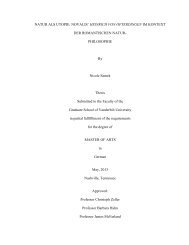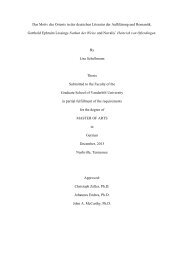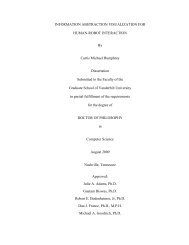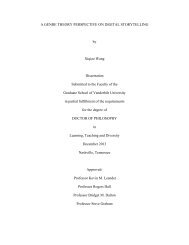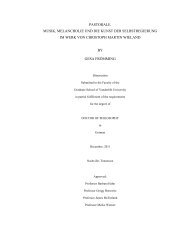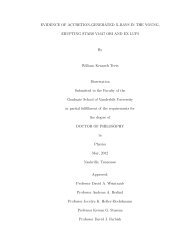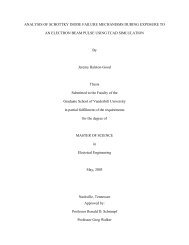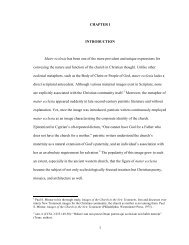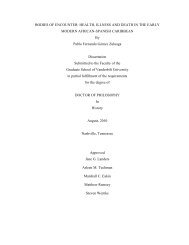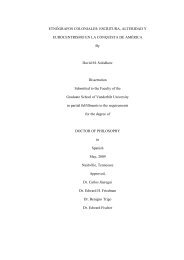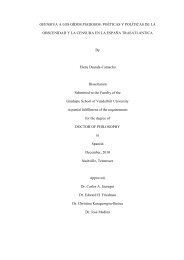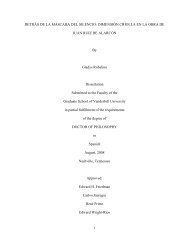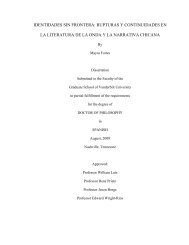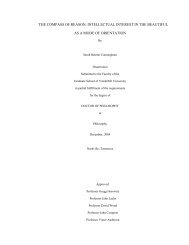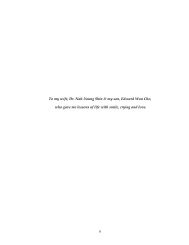THE DEATH OF DIONYSOS - ETD - Vanderbilt University
THE DEATH OF DIONYSOS - ETD - Vanderbilt University
THE DEATH OF DIONYSOS - ETD - Vanderbilt University
You also want an ePaper? Increase the reach of your titles
YUMPU automatically turns print PDFs into web optimized ePapers that Google loves.
[(Goethe’s) portrayal reflects not how Pietism understood itself, so much as the<br />
progressive perspective opened up by its experience of inwardness. The commencement<br />
of a new–worldly–religion distinguishes itself on the basis of an aesthetic-moral self-<br />
awareness.”] To the aunt’s disappointment, the patriarchal Oheim and his Abbé will<br />
strictly limit her contact with her nieces and nephews. It is not just because they are<br />
conducting a grand human experiment–the generation of a new race of godlike humans in<br />
an aesthetic paradise–which, like all experiments, requires strict control of the<br />
environment. 27 Rather, her otherworldly orientation presents a danger to their humanistic,<br />
life-affirming creed. Even her memoirs will be administered, like a sedative, to hysterical<br />
women such as Aurelie, rather than find their way with the other Lehrbriefe into the<br />
pedagogical archive of the Tower. Lovesickness in the novel, as all other forms of<br />
longing, is a derailment of the self from its natural course through self-awareness and<br />
individuation to active autonomy in the world.<br />
Due first to poor health and later to conviction, the schöne Seele never advances so<br />
far. She never becomes a productive member of society. Even acts of charity were<br />
performed out of duty, as a way of “buying [her]self off” (418; EAB 254)–a rare<br />
exception, perhaps, to her otherwise characteristic, concluding assertion: “Ich erinnere<br />
mich kaum eines Gebotes, nichts erscheint mir in Gestalt eines Gesetzes, es ist ein Trieb,<br />
der mich leitet und mich immer recht führet” (420). [“I can scacely remember any<br />
commandment, nothing compels me in the form of law; I am guided by an instinct that<br />
always leads me right” (DWH).] Her lifelong voyage of discovery to harmonious and<br />
beautiful self-awareness constitutes another’s Lehrjahre within Wilhelm Meisters<br />
Lehrjahre. It too, then, is a story of Bildung in the form of a confession, just as she<br />
observes of her first childhood romance with a sickly boy: “soviel trug er zur Bildung<br />
meines Herzens bei” (362). [“it influenced greatly the development of my emotional life<br />
27 Schiller, in a letter to Goethe, describes “Meisters Lehrjahre”, the novel itself, that is, as “eine<br />
Art Experiment” [“a kind of experiment”] , rather than “[e]ine bloß blinde Wirkung der Natur”<br />
[“just a blind force of nature”]. His matter of fact observation goes on to suggest that “die Mächte<br />
des Turms” [“the powers of the Tower”] are the agency or “verborgen wirkender höherer<br />
Verstand” [“hidden but active, higher understanding”] that introduces the experimental character<br />
into what otherwise would be an entirely natural course of development. See letter of July 8, 1796<br />
(HA VII, 640).<br />
23



